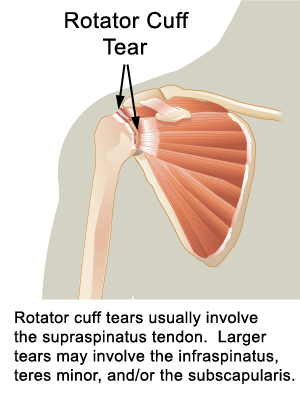Medical Library
Loading...Please Wait
Rotator Cuff Tears

Rotator cuff tears happen in younger people when they experience a trauma such as a fall. In middle-aged people and seniors, rotator cuff tears are usually the result of a gradual wearing out of the rotator cuff tendon(s). The signs and symptoms of rotator cuff tears are pain in the shoulder often radiating down to the middle of the arm especially when the arm is raised overhead, weakness, and in severe cases, a complete loss of the ability to lift the arm. Diagnostic tests sometimes include an arthrogram (a radio-opaque dye is injected into the shoulder, and if it leaks out of the rotator cuff, it can be viewed on x-ray) or an ultrasound, but an M.R.I. of the rotator cuff is the most common test used for diagnosis.
Treatment in young and middle-aged patients is usually arthroscopic or open repair of the torn tendons. In older patients, activity modification, anti-inflammatory medication, physical therapy and cortisone injections are typical. Surgery is an option for patients with pain and dysfunction that does not respond to conservative treatment.
Possible Treatments
- Active Assistive Range of Motion

- Aerobic/Endurance Exercise

- Core Strengthening

- Cryotherapy or Cold Therapy

- Electrotherapeutic Modalities
- Isometric Exercise

- Proprioceptive Neuromuscular Facilitation (PNF)

- Proprioception Exercises

- Physical Agents
- Shoulder Active Range of Motion

- Shoulder Joint Mobilization

- Shoulder Passive Range of Motion

- Shoulder Resistive Range of Motion

- Soft Tissue Mobilization

- Stretching/Flexibility Exercise

Possible Treatment Goals
- Decrease Risk of Reoccurrence
- Improve Fitness
- Improve Function
- Improve Muscle Strength and Power
- Increase Oxygen to Tissues
- Improve Proprioception
- Improve Range of Motion
- Self-care of Symptoms
- Improve Tolerance for Prolonged Activities
- Improve Wound Healing
Additional Resources
Disclaimer
The information within this Medical Library does not represent the views, opinions, advice, or treatment philosophy of E6 Physical Therapy. Any reference herein to any specific commercial product, process, or service by trade name, trademark, manufacturer, or otherwise, does not constitute or imply its endorsement, recommendation, or favoring by E6 Physical Therapy or its employees/affiliates and any such reference shall not be construed as advertising or product endorsement.